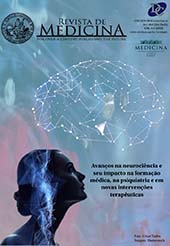Theoretical models of Obsessive-Compulsive Disorder (OCD)
a perspective on future approaches
DOI:
https://doi.org/10.11606/issn.1679-9836.v98i4p273-278Palavras-chave:
Neurobiologia, Diagnóstico, Terapia, Fisiopatologia, Transtorno obsessivo-compulsivoResumo
Obsessive-Compulsive disorder (OCD) is a common psychiatric condition that leads to significant impairment in everyday life. Advancements in neurobiological investigations contributed to a better understanding of pathophysiological mechanisms behind OCD, leading to the understanding that current models employed to conceptualize OCD are not adequate and might be a significant factor in precluding further advancements in how OCD is treated. In this paper, we will use OCD as a model to discuss the limitations of the current diagnostic systems in Psychiatry and to present the novel perspectives based on neurobiological findings that might lead to considerable advancements in treatments for OCD.
Downloads
Os dados de download ainda não estão disponíveis.
Downloads
Publicado
2019-08-30
Edição
Seção
Artigos/Articles
Como Citar
Farhat, L. C., Saraiva, L., Hoexter, M. Q., & Miguel, E. C. (2019). Theoretical models of Obsessive-Compulsive Disorder (OCD): a perspective on future approaches. Revista De Medicina, 98(4), 273-278. https://doi.org/10.11606/issn.1679-9836.v98i4p273-278




